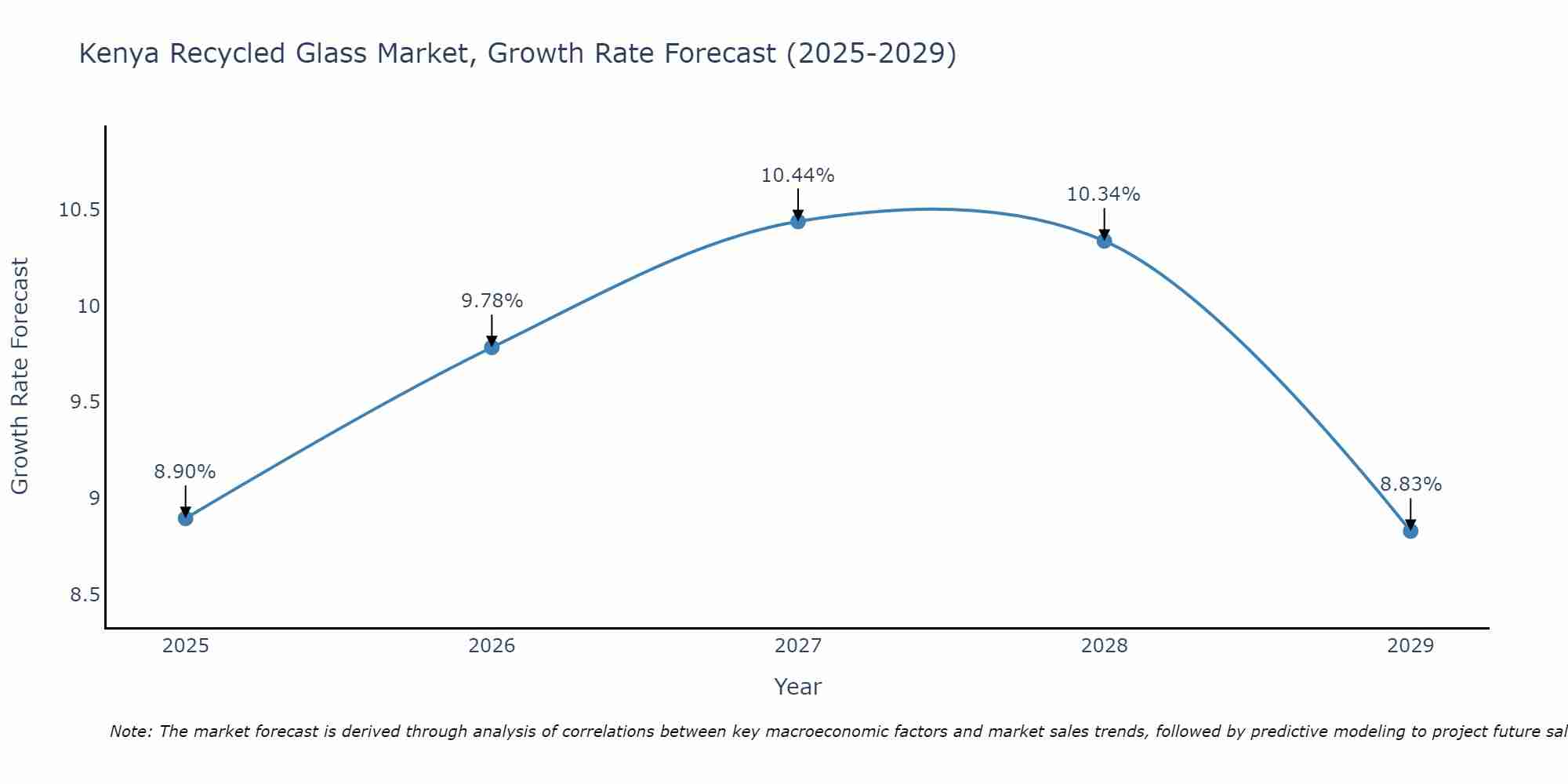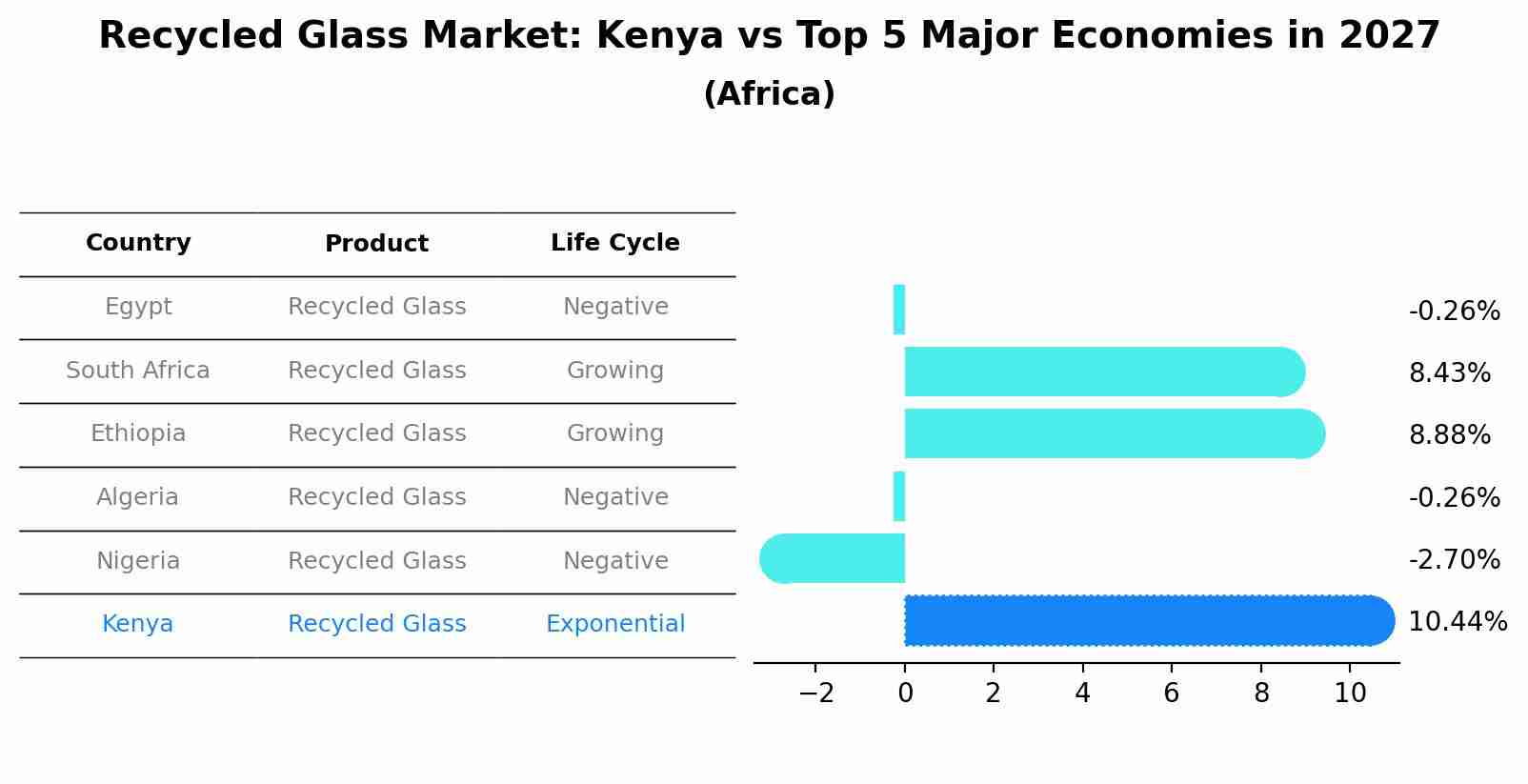Kenya Recycled Glass Market Outlook | Companies, Forecast, COVID-19 IMPACT, Value, Share, Industry, Revenue, Trends, Growth, Size & Analysis
| Product Code: ETC355730 | Publication Date: Aug 2022 | Updated Date: Jul 2025 | Product Type: Market Research Report | |
| Publisher: 6Wresearch | Author: Dhaval Chaurasia | No. of Pages: 75 | No. of Figures: 35 | No. of Tables: 20 |
Kenya Recycled Glass Market Size Growth Rate
The Kenya Recycled Glass Market is projected to witness mixed growth rate patterns during 2025 to 2029. The growth rate begins at 8.90% in 2025, climbs to a high of 10.44% in 2027, and moderates to 8.83% by 2029.

Recycled Glass Market: Kenya vs Top 5 Major Economies in 2027 (Africa)
By 2027, Kenya's Recycled Glass market is forecasted to achieve a high growth rate of 10.44%, with Egypt leading the Africa region, followed by South Africa, Ethiopia, Algeria and Nigeria.

Kenya Recycled Glass Market Synopsis
The Kenya Recycled Glass Market is experiencing steady growth due to increasing awareness about sustainability and environmental conservation. The market is driven by a rising demand for eco-friendly packaging solutions, construction materials, and decorative items. Key players in the market are focusing on developing innovative products made from recycled glass to cater to the growing demand. The government`s initiatives to promote recycling and waste management practices further support the market growth. Additionally, consumer preferences for sustainable products and corporate sustainability goals are propelling the adoption of recycled glass products in various industries. As the market continues to evolve, collaborations between industry players, government agencies, and non-profit organizations are expected to play a crucial role in driving the sustainable growth of the Kenya Recycled Glass Market.
Kenya Recycled Glass Market Trends
The Kenya Recycled Glass Market is experiencing a growing trend towards sustainability and environmental consciousness. With increased awareness about the impact of single-use plastics on the environment, there is a shift towards using recycled glass as a more eco-friendly packaging material. This trend is driven by consumers` preference for sustainable products and the government`s initiatives to promote recycling and reduce waste. Additionally, the demand for recycled glass products such as containers, decorations, and construction materials is on the rise, leading to the expansion of the market. Companies in Kenya are increasingly incorporating recycled glass into their product lines to cater to this growing demand and to align with the global sustainability movement.
Kenya Recycled Glass Market Challenges
In the Kenya Recycled Glass Market, challenges include limited collection infrastructure, inconsistent waste management practices, and a lack of awareness among consumers about the benefits of using recycled glass products. The fragmented nature of the market also poses challenges in terms of standardization and quality control. Additionally, high transportation costs and limited access to recycling facilities hinder the growth of the industry. Furthermore, competition from cheaper imported glass products and the need for more government support and incentives for recycling initiatives create additional obstacles for market players in Kenya. Overall, addressing these challenges will be essential for the sustainable development and success of the recycled glass market in Kenya.
Kenya Recycled Glass Market Investment Opportunities
Investment opportunities in the Kenya Recycled Glass Market include establishing or expanding recycling facilities that process and sort glass waste for sale to manufacturers. Investing in technology and infrastructure to improve collection, sorting, and recycling capabilities can help meet the growing demand for recycled glass in construction, packaging, and art industries. Additionally, investing in research and development for innovative uses of recycled glass, such as eco-friendly building materials or decorative products, can create new revenue streams. Collaborating with local municipalities, businesses, and NGOs to create a sustainable supply chain for recycled glass can also be a lucrative investment opportunity in Kenya`s growing circular economy landscape.
Jordan Agar Market Government Policies
The Kenyan government has implemented various policies to promote the recycled glass market in the country. One significant policy is the ban on single-use plastics, which has led to increased demand for sustainable alternatives such as glass packaging. Additionally, the government has introduced tax incentives and subsidies for businesses involved in glass recycling, aiming to encourage investment in the sector. Furthermore, there are regulations in place to promote the use of recycled glass in construction and infrastructure projects, contributing to the circular economy and reducing environmental impact. These policies collectively support the growth of the recycled glass market in Kenya, fostering a more sustainable and eco-friendly approach to waste management and resource conservation.
Kenya Recycled Glass Market Future Outlook
The future outlook for the Kenya Recycled Glass Market appears promising, driven by increasing awareness of environmental sustainability and the growing demand for eco-friendly products. With the government`s emphasis on promoting recycling initiatives and reducing waste, coupled with an expanding middle class population with a preference for sustainable goods, the market is expected to experience steady growth. Additionally, the construction and packaging industries are increasingly adopting recycled glass as a cost-effective and environmentally friendly alternative. Innovations in recycling technologies and processes are likely to further boost market growth, offering opportunities for both local producers and international players looking to invest in the Kenyan market. Overall, the Kenya Recycled Glass Market is poised for expansion in the coming years.
Key Highlights of the Report:
- Kenya Recycled Glass Market Outlook
- Market Size of Kenya Recycled Glass Market, 2021
- Forecast of Kenya Recycled Glass Market, 2031
- Historical Data and Forecast of Kenya Recycled Glass Revenues & Volume for the Period 2018 - 2031
- Kenya Recycled Glass Market Trend Evolution
- Kenya Recycled Glass Market Drivers and Challenges
- Kenya Recycled Glass Price Trends
- Kenya Recycled Glass Porter's Five Forces
- Kenya Recycled Glass Industry Life Cycle
- Historical Data and Forecast of Kenya Recycled Glass Market Revenues & Volume By Product for the Period 2018 - 2031
- Historical Data and Forecast of Kenya Recycled Glass Market Revenues & Volume By Crushed Glass for the Period 2018 - 2031
- Historical Data and Forecast of Kenya Recycled Glass Market Revenues & Volume By Cullets for the Period 2018 - 2031
- Historical Data and Forecast of Kenya Recycled Glass Market Revenues & Volume By Glass Powder for the Period 2018 - 2031
- Historical Data and Forecast of Kenya Recycled Glass Market Revenues & Volume By Application for the Period 2018 - 2031
- Historical Data and Forecast of Kenya Recycled Glass Market Revenues & Volume By Glass Bottle & Containers for the Period 2018 - 2031
- Historical Data and Forecast of Kenya Recycled Glass Market Revenues & Volume By Flat Glass for the Period 2018 - 2031
- Historical Data and Forecast of Kenya Recycled Glass Market Revenues & Volume By Fiber Glass for the Period 2018 - 2031
- Historical Data and Forecast of Kenya Recycled Glass Market Revenues & Volume By Highway Beads for the Period 2018 - 2031
- Historical Data and Forecast of Kenya Recycled Glass Market Revenues & Volume By Abrasives for the Period 2018 - 2031
- Historical Data and Forecast of Kenya Recycled Glass Market Revenues & Volume By Fillers for the Period 2018 - 2031
- Historical Data and Forecast of Kenya Recycled Glass Market Revenues & Volume By Others for the Period 2018 - 2031
- Kenya Recycled Glass Import Export Trade Statistics
- Market Opportunity Assessment By Product
- Market Opportunity Assessment By Application
- Kenya Recycled Glass Top Companies Market Share
- Kenya Recycled Glass Competitive Benchmarking By Technical and Operational Parameters
- Kenya Recycled Glass Company Profiles
- Kenya Recycled Glass Key Strategic Recommendations
Frequently Asked Questions About the Market Study (FAQs):
- Single User License$ 1,995
- Department License$ 2,400
- Site License$ 3,120
- Global License$ 3,795
Search
Thought Leadership and Analyst Meet
Our Clients
Related Reports
- Canada Oil and Gas Market (2026-2032) | Share, Segmentation, Value, Industry, Trends, Forecast, Analysis, Size & Revenue, Growth, Competitive Landscape, Outlook, Companies
- Germany Breakfast Food Market (2026-2032) | Industry, Share, Growth, Size, Companies, Value, Analysis, Revenue, Trends, Forecast & Outlook
- Australia Briquette Market (2025-2031) | Growth, Size, Revenue, Forecast, Analysis, Trends, Value, Share, Industry & Companies
- Vietnam System Integrator Market (2025-2031) | Size, Companies, Analysis, Industry, Value, Forecast, Growth, Trends, Revenue & Share
- ASEAN and Thailand Brain Health Supplements Market (2025-2031) | Strategy, Consumer Insights, Analysis, Investment Trends, Opportunities, Growth, Size, Share, Industry, Revenue, Segments, Value, Segmentation, Supply, Forecast, Restraints, Outlook, Competition, Drivers, Trends, Demand, Pricing Analysis, Competitive, Strategic Insights, Companies, Challenges
- ASEAN Bearings Market (2025-2031) | Strategy, Consumer Insights, Analysis, Investment Trends, Opportunities, Growth, Size, Share, Industry, Revenue, Segments, Value, Segmentation, Supply, Forecast, Restraints, Outlook, Competition, Drivers, Trends, Demand, Pricing Analysis, Competitive, Strategic Insights, Companies, Challenges
- Europe Flooring Market (2025-2031) | Outlook, Share, Industry, Trends, Forecast, Companies, Revenue, Size, Analysis, Growth & Value
- Saudi Arabia Manlift Market (2025-2031) | Outlook, Size, Growth, Trends, Companies, Industry, Revenue, Value, Share, Forecast & Analysis
- Uganda Excavator, Crane, and Wheel Loaders Market (2025-2031) | Strategy, Consumer Insights, Analysis, Investment Trends, Opportunities, Growth, Size, Share, Industry, Revenue, Segments, Value, Segmentation, Supply, Forecast, Restraints, Outlook, Competition, Drivers, Trends, Demand, Pricing Analysis, Competitive, Strategic Insights, Companies, Challenges
- Rwanda Excavator, Crane, and Wheel Loaders Market (2025-2031) | Strategy, Consumer Insights, Analysis, Investment Trends, Opportunities, Growth, Size, Share, Industry, Revenue, Segments, Value, Segmentation, Supply, Forecast, Restraints, Outlook, Competition, Drivers, Trends, Demand, Pricing Analysis, Competitive, Strategic Insights, Companies, Challenges
Industry Events and Analyst Meet
Whitepaper
- Middle East & Africa Commercial Security Market Click here to view more.
- Middle East & Africa Fire Safety Systems & Equipment Market Click here to view more.
- GCC Drone Market Click here to view more.
- Middle East Lighting Fixture Market Click here to view more.
- GCC Physical & Perimeter Security Market Click here to view more.
6WResearch In News
- Doha a strategic location for EV manufacturing hub: IPA Qatar
- Demand for luxury TVs surging in the GCC, says Samsung
- Empowering Growth: The Thriving Journey of Bangladesh’s Cable Industry
- Demand for luxury TVs surging in the GCC, says Samsung
- Video call with a traditional healer? Once unthinkable, it’s now common in South Africa
- Intelligent Buildings To Smooth GCC’s Path To Net Zero


















